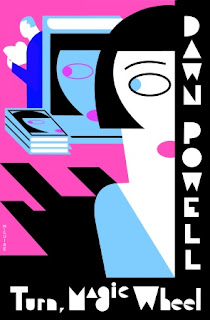 I received this book from a coworker as a gift nearly three years ago. Respecting both her and her taste, I was ready for a literary gem. Well, unsurprisingly, I intended to read it right away and then three years went by before it popped into my head for some reason or another (most likely because of the rather delightful cover which is rather memorable in my mind), and I started reading it without glancing at the back cover for a reminder as to its topic. My opinion holds firm -- this was quite a delightful book.
I received this book from a coworker as a gift nearly three years ago. Respecting both her and her taste, I was ready for a literary gem. Well, unsurprisingly, I intended to read it right away and then three years went by before it popped into my head for some reason or another (most likely because of the rather delightful cover which is rather memorable in my mind), and I started reading it without glancing at the back cover for a reminder as to its topic. My opinion holds firm -- this was quite a delightful book.Turn, Magic Wheel is one of Dawn Powell's New York novels and she personally considered this her best work. The plot is this: Dennis Orphen has written a novel about a woman, left by her famous author husband -- cannibalizing the life of his friend, Effie Callingham, to do so. Effie is the first wife of Andy Calligham, who has since become a rising star in the literary world, and he left her several years before the start of our story. Despite that, Effie still lives in a world where she is still addressed as "Mrs. Callingham," though no one is deceived, except for Effie. Dennis takes few pains to conceal that his novel is about Effie and Andy Callingham, and our story almost immediately opens with Effie discovering his advance copy of the book, realizing that now the reality of her abandonment will be made public knowledge. This betrayal is one of many in the novel, and arguably, it isn't even the worst thing that one person does to another. A poignant and lovely novel, Turn, Magic Wheel is also a delightfully witty and wicked look at the New York literary scene.
The title of the book comes from Theocritus: "Turn, magic wheel / Bring homeward him I love" which vaguely outlines a bit of what is to be expected in this book. The action hinges on the fact that we spend a great deal of time talking about Andy Callingham, the famous writer (and modeled on Hemingway), but we're all waiting for him to appear, for only with his arrival can we sort anything out.
Powell has created wonderful characters, painfully and beautifully real. One frequently wishes to slap some sense into Dennis; he can be so curious about the lives of others, still be completely wrapped up in his own, and find himself totally flummoxed when the reality of someone else's life actually dawns on him. Somehow, this novel is both a biting satire and yet still an unconventional... I hesitate to use the phrase "love story," but there are elements of that, too.
Certainly, for anyone who loves New York and literature, I think they'll enjoy this novel. Dawn Powell writes about New York as if it's more than just a setting... it's another character, living and breathing around the others, with a life and hum and energy. I'm certainly looking forward to discovering more of Dawn Powell's work, and I'm quite in the debt of my former co-worker for exposing me to her writing.
Also, I might also direct you to a New York Times review of this book, published in 1936. I don't know why this delights me so... perhaps it's simply the idea of the NY Times actually bothering to put its book reviews from the 30s online, but it makes me quite happy.


